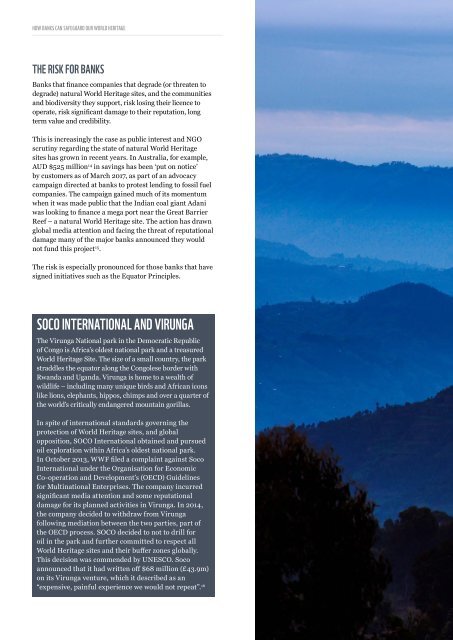Bios-Cons-Nat-Pro-155
Create successful ePaper yourself
Turn your PDF publications into a flip-book with our unique Google optimized e-Paper software.
HOW BANKS CAN SAFEGUARD OUR WORLD HERITAGE<br />
13<br />
THE RISK FOR BANKS<br />
Banks that finance companies that degrade (or threaten to<br />
degrade) natural World Heritage sites, and the communities<br />
and biodiversity they support, risk losing their licence to<br />
operate, risk significant damage to their reputation, long<br />
term value and credibility.<br />
This is increasingly the case as public interest and NGO<br />
scrutiny regarding the state of natural World Heritage<br />
sites has grown in recent years. In Australia, for example,<br />
AUD $525 million 14 in savings has been ‘put on notice’<br />
by customers as of March 2017, as part of an advocacy<br />
campaign directed at banks to protest lending to fossil fuel<br />
companies. The campaign gained much of its momentum<br />
when it was made public that the Indian coal giant Adani<br />
was looking to finance a mega port near the Great Barrier<br />
Reef – a natural World Heritage site. The action has drawn<br />
global media attention and facing the threat of reputational<br />
damage many of the major banks announced they would<br />
not fund this project 15 .<br />
The risk is especially pronounced for those banks that have<br />
signed initiatives such as the Equator Principles.<br />
SOCO ANNOUNCED THAT IT HAD WRITTEN<br />
OFF $68 MILLION (£43.9M) ON ITS<br />
VIRUNGA VENTURE, WHICH IT DESCRIBED<br />
AS AN “EXPENSIVE, PAINFUL EXPERIENCE<br />
WE WOULD NOT REPEAT”<br />
SOCO INTERNATIONAL AND VIRUNGA<br />
The Virunga <strong>Nat</strong>ional park in the Democratic Republic<br />
of Congo is Africa’s oldest national park and a treasured<br />
World Heritage Site. The size of a small country, the park<br />
straddles the equator along the Congolese border with<br />
Rwanda and Uganda. Virunga is home to a wealth of<br />
wildlife – including many unique birds and African icons<br />
like lions, elephants, hippos, chimps and over a quarter of<br />
the world’s critically endangered mountain gorillas.<br />
In spite of international standards governing the<br />
protection of World Heritage sites, and global<br />
opposition, SOCO International obtained and pursued<br />
oil exploration within Africa’s oldest national park.<br />
In October 2013, WWF filed a complaint against Soco<br />
International under the Organisation for Economic<br />
Co-operation and Development’s (OECD) Guidelines<br />
for Multinational Enterprises. The company incurred<br />
significant media attention and some reputational<br />
damage for its planned activities in Virunga. In 2014,<br />
the company decided to withdraw from Virunga<br />
following mediation between the two parties, part of<br />
the OECD process. SOCO decided to not to drill for<br />
oil in the park and further committed to respect all<br />
World Heritage sites and their buffer zones globally.<br />
This decision was commended by UNESCO. Soco<br />
announced that it had written off $68 million (£43.9m)<br />
on its Virunga venture, which it described as an<br />
“expensive, painful experience we would not repeat”. 16<br />
Volcanoes NP, Virunga Mountains, Rwanda.<br />
Home of the last Mountain Gorillas<br />
© NATUREPL.COM / ANDY ROUSE / WWF


